Terry Teachout's Blog, page 281
October 5, 2010
TT: Almanac
Tom Stoppard, Night and Day
October 3, 2010
TT: Un-Shaw of themselves
* * *
Nobody ever says the word "prostitution" out loud in George Bernard Shaw's "Mrs. Warren's Profession," even though the oldest profession is what it's all about. Small wonder: The play was written in 1894, but nobody dared to perform it on stage until 1902, Victorian prudery being what it was, and it has only been in recent years that "Mrs. Warren's Profession" has been seen at all regularly in this country. Nowadays, though, interest in Shaw's early work is on the upswing, and the Roundabout Theatre Company's Broadway revival is the play's third major American mounting so far this year (it was previously presented by California Shakespeare Theater and the Shakespeare Theatre Company of Washington, D.C.). Could it be that the once-scandalous, now-titillating subject matter of "Mrs. Warren's Profession" makes it more attractive to modern audiences? I wouldn't be surprised--but I'm sorry to say that the Roundabout's erratic version has little else to offer.
On paper, the Roundabout's "Mrs. Warren" looked like a sure thing. Cherry Jones, who is as accomplished a stage actor as we have today, plays the unapologetically vulgar madam whose "private hotels" are sufficiently profitable to allow her to buy Vivie (Sally Hawkins), her brainy daughter, a place in respectable English society. The staging is by Doug Hughes, who directed Ms. Jones in "Doubt," and the sets are by Scott Pask, whose list of noteworthy design credits is several feet long. In addition to Ms. Jones, the cast includes such familiar faces as Mark Harelik, Edward Hibbert and Michael Siberry.
So what went wrong? Pretty much everything, though by far the worst offender is Ms. Hawkins, a British film and TV actor of some note whose performance as Vivie couldn't be further off the mark. Shaw's stage directions describe Vivie as the quintessential example of "the sensible, able, highly-educated young middle-class Englishwoman....strong, confident, self-possessed." For Ms. Hawkins to play her as a squeaky, flighty semi-tomboy is thus nonsensical, and the fact that she swallows at least half of her lines renders large chunks of the play all but unintelligible....
* * *
The print version of the Journal's Greater New York section only appears in copies of the paper published in the New York area, but the complete contents of the section are available on line, and you can read my review of Mrs. Warren's Profession by going here .
TT: Almanac
Tom Stoppard, Night and Day
TT: Full Cleveland
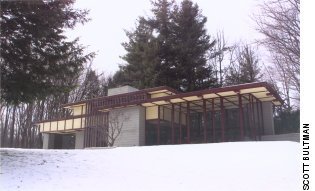 Best of all, we've returned to the
Penfield House
, one of the half-dozen houses designed by Frank Lloyd Wright that are available for short-term rental. I wrote about the house
at length
when Mrs. T and I last stayed here a couple of years ago, so I won't repeat myself--suffice it to say that I can't imagine a more satisfying place to live.
Best of all, we've returned to the
Penfield House
, one of the half-dozen houses designed by Frank Lloyd Wright that are available for short-term rental. I wrote about the house
at length
when Mrs. T and I last stayed here a couple of years ago, so I won't repeat myself--suffice it to say that I can't imagine a more satisfying place to live.I'm also pleased to report that you can't connect to the Web at the Penfield House. You have to drive to the parking lot of a Wendy's that is located a mile from the gate. Normally I'd find this oppressive, but under the circumstances I regard it as downright liberating. We've brought along plenty of books and compact discs, and we mean to turn loose the burdens of dailiness and enjoy being where we are while we're here.
To this end, I guarantee that you will hear nothing whatsoever from me between now and next Monday save for the usual routine almanac entries and theater-related postings (I do have to write my Friday drama column, after all!). My colleagues will do the heavy lifting until I return.
October 1, 2010
TT: A second Scoop
* * *
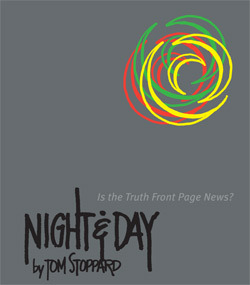 Remy Bumppo Theatre Company, which specializes in brainy, challenging scripts, is doing a real service to the republic of letters by reviving "Night and Day," the most obscure of Tom Stoppard's major plays. It had only a modest run on Broadway in 1979 and hasn't been performed anywhere in New York since 2001, and I regret to say that I think I know why. Mr. Stoppard's slightly-right-of-center opinions, which are anathema to most theater people, are rather easier than usual to discern from the plot of "Night and Day," in which Dick Wagner (Shawn Douglass), an amiably unscrupulous left-wing foreign correspondent, wanders into an unnamed African country in search of hot copy and stumbles onto a story that blows up in his face....
Remy Bumppo Theatre Company, which specializes in brainy, challenging scripts, is doing a real service to the republic of letters by reviving "Night and Day," the most obscure of Tom Stoppard's major plays. It had only a modest run on Broadway in 1979 and hasn't been performed anywhere in New York since 2001, and I regret to say that I think I know why. Mr. Stoppard's slightly-right-of-center opinions, which are anathema to most theater people, are rather easier than usual to discern from the plot of "Night and Day," in which Dick Wagner (Shawn Douglass), an amiably unscrupulous left-wing foreign correspondent, wanders into an unnamed African country in search of hot copy and stumbles onto a story that blows up in his face....In truth, though, "Night and Day" isn't so much anti-liberal as anti-totalitarian (though Mr. Stoppard does see the closed shop as a form of totalitarianism, a point of view that will make him few friends on the left). It's also witty and heartfelt, especially in its sharp-eyed but sympathetic portrayal of Ruth Carson (Linda Gillum), an expatriate of a certain age whose too-placid marriage to an older man (played by David Darlow) has given her a wandering eye. The whole thing adds up to a modern-day counterpart of "Scoop," Evelyn Waugh's cynical fantasia about the hijinks of British journalists abroad, except that Mr. Stoppard's play is more serious, more realistic and much more moving.
This revival, directed by James Bohnen, the company's outgoing artistic director, is so good that it could be transplanted to Broadway exactly as is. The actors, many of whom have appeared together in other Remy Bumppo productions, work in awe-inspiring concord...
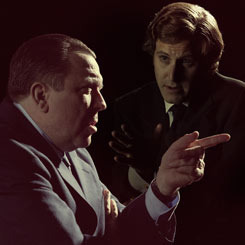 The more I see of Chicago's TimeLine Theatre Company, the more impressed I am by the way in which it goes about its self-defined task of producing historical dramas "that connect with today's social and political issues." That may sound like an eat-your-spinach-and-like it mission statement, but TimeLine takes great care to choose interesting plays, then mounts them in its 87-seat theater with a combination of panache and flamboyant physical dynamism that I find irresistible.
The more I see of Chicago's TimeLine Theatre Company, the more impressed I am by the way in which it goes about its self-defined task of producing historical dramas "that connect with today's social and political issues." That may sound like an eat-your-spinach-and-like it mission statement, but TimeLine takes great care to choose interesting plays, then mounts them in its 87-seat theater with a combination of panache and flamboyant physical dynamism that I find irresistible.TimeLine's stripped-down stagings of Alan Bennett's "The History Boys" and Aaron Sorkin's "The Farnsworth Invention," a pair of smart but slick plays that didn't quite add up when I saw them on Broadway, were unequivocally superior to the original productions. Now the company has taken on a tougher nut, the Chicago premiere of Peter Morgan's "Frost/Nixon," a docudrama about the 1977 TV interviews in which David Frost grilled Richard Nixon about Watergate and got him to admit on camera that he'd "let the American people down." Superficial though it is, "Frost/Nixon" profited on Broadway and in London from a brilliant staging by Michael Grandage and an unforgettable portrayal of Nixon by Frank Langella, who repeated his performance in Ron Howard's 2008 film version of the play.
How do you top that? You don't. Instead, TimeLine has put a totally different, identically persuasive spin on "Frost/Nixon" by presenting it not in a Broadway-sized house but in an attention-focusing space that is itself scarcely bigger than a TV studio. Keith Pitts' semi-circular set subtly evokes the Oval Office from which Nixon retreated in disgrace, and Mike Tutaj's rear-wall projections transport the viewer from place to place with discreet finesse....
* * *
Read the whole thing here .
TT: They can't dance (don't ask them)
* * *
If you flipped over "Billy Elliot," then the Manhattan Theatre Club is clearly hoping that you'll do a double backflip for "The Pitmen Painters," a new play by Lee Hall, who wrote the book for the hit musical about an English coal miner's son who becomes a ballet dancer. This time around, Mr. Hall has given us a fictionalized version of the real-life story of the Ashington Group of Unprofessional Artists, a bunch of Depression-era miners who took a course in art appreciation and subsequently became famous painters (though only briefly so--they're forgotten today) while continuing to dig coal. The difference is that nobody in "The Pitmen Painters" wears toe shoes or lifts his voice in song to express the heartfelt hope that Margaret Thatcher will fry in hell. Otherwise, the two shows are strikingly similar, both being political tearjerkers that are deeply rooted in the labyrinthine peculiarities of the British class system. In fact, there's only one significant difference between them: "The Pitmen Painters" is good.
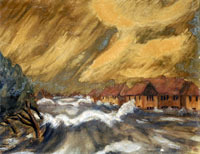 Not great, you understand, so don't be fooled by the near-hysterical quotes from London's critical corps that have been trotted out as sucker bait for Manhattan theatergoers. Stripped of the finger-wagging socialist sermonizing that spoils the last ten minutes of the play, "The Pitmen Painters" is a "Full Monty"-type commercial comedy about five working-class blokes with inch-thick accents ("We just want to knaa aboot proper art") who turn out to be smarter, nobler and more talented than Robert Lyon (Ian Kelly), the well-meaning but unconsciously patronizing university man who deigns to introduce them to the joys of painting. But if you don't mind going along with Mr. Hall and the accomplished ensemble cast that executes his well-worn tricks, you'll find "The Pitmen Painters" to be both entertaining and touching--as well as unexpectedly intelligent whenever the characters discuss the art form that has changed their lives....
Not great, you understand, so don't be fooled by the near-hysterical quotes from London's critical corps that have been trotted out as sucker bait for Manhattan theatergoers. Stripped of the finger-wagging socialist sermonizing that spoils the last ten minutes of the play, "The Pitmen Painters" is a "Full Monty"-type commercial comedy about five working-class blokes with inch-thick accents ("We just want to knaa aboot proper art") who turn out to be smarter, nobler and more talented than Robert Lyon (Ian Kelly), the well-meaning but unconsciously patronizing university man who deigns to introduce them to the joys of painting. But if you don't mind going along with Mr. Hall and the accomplished ensemble cast that executes his well-worn tricks, you'll find "The Pitmen Painters" to be both entertaining and touching--as well as unexpectedly intelligent whenever the characters discuss the art form that has changed their lives....* * *
The print version of the Journal's Greater New York section only appears in copies of the paper published in the New York area, but the complete contents of the section are available on line, and you can read my review of The Pitmen Painters by going here .
TT: Heard about any great plays lately?
* * *
Sometimes a passing comment can be more telling than a considered one. In reviewing the recent New York premiere of "Me, Myself & I," Edward Albee's latest play, I remarked that "Who's Afraid of Virginia Woolf?" is "the only one of Mr. Albee's 30 plays to have made an enduring impression on the general public--indeed, it's possible that 'Virginia Woolf' could be the last American play of any kind to have made such an impression." A number of readers wrote to me about that observation, and their reactions can be boiled down into a one-word reply: Really? So I gave it some additional thought, and the more I thought about it, the more certain I became that I'd inadvertently put my finger on something that is of relevance not just to Mr. Albee's career, but to the increasingly shaky standing of high culture in postmodern America....
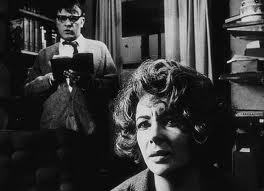 Forty-eight years after the fact, it's easy to forget that the controversy that greeted the premiere of "Virginia Woolf," which in 1962 was thought by many Americans to be frank to the point of obscenity, made Edward Albee famous. How famous? Enough so that Johnny Carson invited him onto "The Tonight Show" four years later to promote his latest play, "A Delicate Balance." (He shared the Carson couch with Duke Ellington.) Not long afterward, Life magazine published a lengthy, lavishly illustrated profile of Mr. Albee. In the '60s, you couldn't get much more famous than that....
Forty-eight years after the fact, it's easy to forget that the controversy that greeted the premiere of "Virginia Woolf," which in 1962 was thought by many Americans to be frank to the point of obscenity, made Edward Albee famous. How famous? Enough so that Johnny Carson invited him onto "The Tonight Show" four years later to promote his latest play, "A Delicate Balance." (He shared the Carson couch with Duke Ellington.) Not long afterward, Life magazine published a lengthy, lavishly illustrated profile of Mr. Albee. In the '60s, you couldn't get much more famous than that....Back then, the national media still devoted a considerable amount of time and space to covering high culture. Even if you didn't live in New York, you could still read a review of an important play in a weekly newsmagazine, watch a scene being performed by the original cast on "The Ed Sullivan Show" or see the author being interviewed on "Tonight" or "Today." Moreover, wire-service coverage of big-city cultural events was routinely carried by local newspapers throughout the country. As a result, it was possible well into the '70s for a high-culture artist to become known to the public at large....
No more. The national media have mostly stopped covering high culture--nowadays they are besotted by Hollywood--meaning that it is no longer possible for an artist like Mr. Albee to win true fame....
* * *
Read the whole thing here .
TT: Almanac
H.L. Mencken, "The American Magazine"
September 30, 2010
TT: So you want to see a show?
Here's my list of recommended Broadway, off-Broadway, and out-of-town shows, updated weekly. In all cases, I gave these shows favorable reviews (if sometimes qualifiedly so) in The Wall Street Journal when they opened. For more information, click on the title.
Warning: Broadway shows marked with an asterisk were sold out, or nearly so, last week.
BROADWAY:
• La Cage aux Folles (musical, PG-13, adult subject matter, reviewed here)
• Fela! (musical, PG-13, adult subject matter, closes Jan. 2, reviewed here)
• Million Dollar Quartet (jukebox musical, G, reviewed here)
OFF BROADWAY:
• Alfred Hitchcock's The 39 Steps (comedy, G, suitable for bright children, original Broadway production reviewed here)
• Avenue Q (musical, R, adult subject matter and one show-stopping scene of puppet-on-puppet sex, reviewed here)
• The Fantasticks (musical, G, suitable for children capable of enjoying a love story, reviewed here)
• The Little Foxes (drama, G, unsuitable for children, brilliantly acted but tritely staged, closes Oct. 31, reviewed here)
IN ASHLAND, OREGON:
• Hamlet (Shakespeare, PG-13, closes Oct. 30, reviewed here)
• Ruined (drama, PG-13/R, violence and adult subject matter, closes Oct. 31, reviewed here)
• She Loves Me (musical, G, suitable for children capable of enjoying a love story, closes Oct. 30, reviewed here)
CLOSING SOON IN LOS ANGELES:
• The Glass Menagerie (drama, G, West Coast remounting of original New Haven/off-Broadway production, too dark for children, closes Oct. 17, off-Broadway run reviewed here)
• Ruined (drama, PG-13/R, West Coast remounting of original Chicago/off-Broadway production, violence and adult subject matter, closes Oct. 17, off-Broadway run reviewed here)
CLOSING SATURDAY IN SPRING GREEN, WISCONSIN:
• Major Barbara (serious comedy, G, too complicated for children, reviewed here)
TT: Almanac
Edmond and Jules de Goncourt, journal entry, July 1858
Terry Teachout's Blog
- Terry Teachout's profile
- 45 followers



